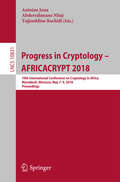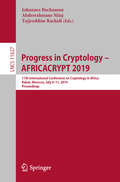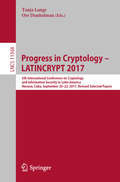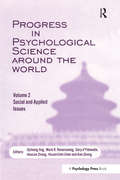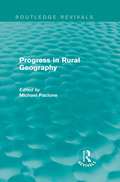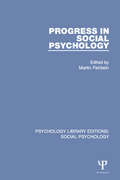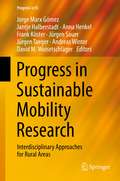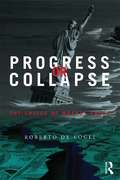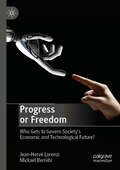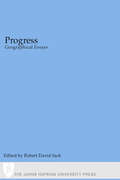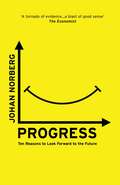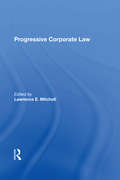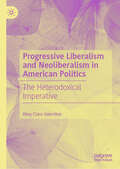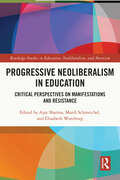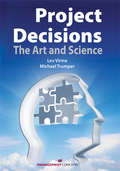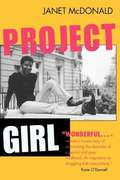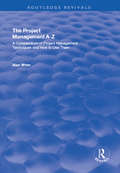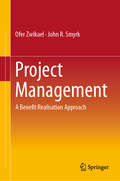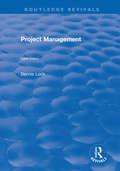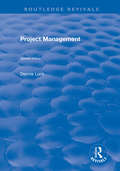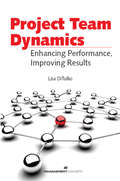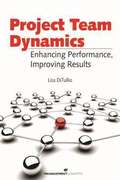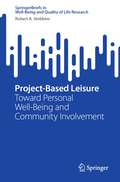- Table View
- List View
Progress in Cryptology – AFRICACRYPT 2018: 10th International Conference On Crytology In Africa, Marrakesh, Morocco, May 7-9, 2018, Proceedings (Lecture Notes in Computer Science #10831)
by Abderrahmane Nitaj Tajjeeddine Rachidi Antoine JouxThis book constitutes the refereed proceedings of the 10th International Conference on the Theory and Application of Cryptographic Techniques in Africa, AFRICACRYPT 2018, held in Marrakesh, Morocco, in May 2018. The 19 papers presented in this book were carefully reviewed and selected from 54 submissions. AFRICACRYPT is a major scientific event that seeks to advance and promote the field of cryptology on the African continent. The conference has systematically drawn some excellent contributions to the field. The conference has always been organized in cooperation with the International Association for Cryptologic Research (IACR).
Progress in Cryptology – AFRICACRYPT 2019: 11th International Conference on Cryptology in Africa, Rabat, Morocco, July 9–11, 2019, Proceedings (Lecture Notes in Computer Science #11627)
by Johannes Buchmann Abderrahmane Nitaj Tajjeeddine RachidiThis book constitutes the refereed proceedings of the 11th International Conference on the Theory and Application of Cryptographic Techniques in Africa, AFRICACRYPT 2019, held in Rabat, Morocco, in July 2019. The 22 papers presented in this book were carefully reviewed and selected from 53 submissions. The papers are organized in topical sections on protocols; post-quantum cryptography; zero-knowledge; lattice based cryptography; new schemes and analysis; block ciphers; side-channel attacks and countermeasures; signatures. AFRICACRYPT is a major scientific event that seeks to advance and promote the field of cryptology on the African continent. The conference has systematically drawn some excellent contributions to the field. The conference has always been organized in cooperation with the International Association for Cryptologic Research (IACR).
Progress in Cryptology – LATINCRYPT 2017: 5th International Conference on Cryptology and Information Security in Latin America, Havana, Cuba, September 20–22, 2017, Revised Selected Papers (Lecture Notes in Computer Science #11368)
by Orr Dunkelman Tanja LangeThis book constitutes the refereed post-conference proceedings of the 5th International Conference on Cryptology and Information Security in Latin America, LATINCRYPT 2017, held in Havana, Cuba, in September 2017.The 20 papers presented were carefully reviewed and selected from 64 submissions. They are organized in the following topical sections: security protocols; public-key implementation; cryptanalysis; theory of symmetric-key cryptography; multiparty computation and privacy; new constructions; and adversarial cryptography.
Progress in Psychological Science Around the World. Volume 2: Proceedings of the 28th International Congress of Psychology
by Qicheng Jing, Mark R. Rosenzweig, Géry d’Ydewalle, Houcan Zhang, Hsuan-Chih Che, and Kan ZhangProgress in Psychological Science around the World, Volumes 1 and 2, present the main contributions from the 28th International Congress of Psychology, held in Beijing in 2004. These expert contributions include the Nobel laureate address, the Presidential address, and the Keynote and State-of-the-Art lectures. They are written by international leaders in psychology from 25 countries and regions around the world. The authors present a variety of approaches and perspectives that reflect cutting-edge advances in psychological science. This second volume builds on the coverage of neural, cognitive, and developmental issues from the first volume, to address social and applied issues in modern psychology. The topics covered include: educational psychology and measurement, health psychology, and social and cultural psychology. Organizational, applied, and international psychology are also discussed. Progress in Psychological Science around the World, with its broad coverage of psychological research and practice, and its highly select group of world renowned authors, will be invaluable for researchers, professionals, teachers, and students in the field of psychology.
Progress in Rural Geography (Routledge Revivals)
by Michael PacioneThis wide-ranging volume, first published in 1983, reflects the increasing scope of the field of rural geography in the second half of the twentieth century. Although traditional areas of study such as agriculture and the land-use patterns of the countryside remained important, scholars also began to consider rural transport, employment, housing and policy, as well as to develop new theories and methodologies for application to study. The chapters included here addressed the need for a review of the changes that had taken place within the field of rural geography, and as such provide an essential background to students with an interest in rural demography, planning and agriculture.
Progress in Social Psychology: Volume 1 (Psychology Library Editions: Social Psychology)
by Martin FishbeinOriginally published in 1980, this title was the first of a new monograph series in social psychology. The editor presents a format for showing the progress of social psychology as a viable, exciting and relevant discipline. <P><P>The papers contained in this volume represent progress in theory and method as well as in basic and applied research. In addition, recognising that not all social psychology is produced by people who label themselves as ‘social psychologists’ the volume contains the contributions of scholars who are best known for their work in other areas.
Progress in Sustainable Mobility Research: Interdisciplinary Approaches for Rural Areas (Progress in IS)
by Andreas Winter Jorge Marx Gómez Jantje Halberstadt Jürgen Sauer Anna Henkel Frank Köster Jürgen Taeger David M. WoisetschlägerThis book presents the outcomes of the trans- and interdisciplinary research project NEMo (Nachhaltige Erfüllung von Mobilitätsbedürfnissen im ländlichen Raum - Sustainable Fulfilment of Mobility Needs in Rural Areas). Due to demographic change, it is becoming increasingly difficult for rural districts and communities to maintain a basic set of public transport services such as bus and train transit without encountering issues regarding necessary social participation, sensible regional value creation and, last but not least, achievable environmental protection goals. At the same time, the demand for mobility in rural areas will continue to rise in the future, e.g. due to the concentration of medical care facilities and shopping centres close to cities. Focusing on the development of sustainable and innovative mobility services and business models, this book explains how new mobility offers can be created in which citizens themselves become mobility providers. To do so, it combines the findings of the individual research groups with external contributions from science and practice.
Progress or Collapse: The Crises of Market Greed
by Roberto De VogliHuman progress is heading toward collapse. There are converging ecological crises looming on the horizon: climate change, peak oil, water shortages, fish depletion and food scarcities. The world is on a collision course against the limits of the ecosystem. Modern societies are consuming, polluting and growing as if there is no tomorrow. Indeed, there may not be one. In Progress or Collapse, Roberto De Vogli guides us through the multiple converging global crises of economic progress. He explores the connections between the environmental crisis and the psychological, social, cultural, political and economic emergencies affecting modern societies. It is not a coincidence, the author argues, that global ecological destruction is occurring in tandem with other crises: rising mental disorders, mindless consumerism, rampant conformism, status competition, civic disengagement, startling social inequalities, global financial instability, and widespread political impasse. In this hard-hitting analysis, Roberto De Vogli identifies the root cause of all these symptoms of societal breakdown: neoliberalism, defined as market greed. He argues that in recent decades, modern societies have been dominated by a suicidal economic doctrine based on two articles of faith: the greed creed and the market God. The greed creed states that people are nothing but selfish profiteers in a perpetual search for status and wealth. The market God is the belief that all societal and human affairs are best regulated as market exchanges. What is to be done? Can we stop progress toward collapse? Given the current distribution of power and wealth, and the state of psychological and political inertia in which we are trapped, our chances of redefining progress around alternative values and embracing a new philosophy of life are slim. Yet, the history of human emancipation has often been shaped by giant leaps forward. In the past, civic struggles have overcome "the limits of the possible". Whether this will happen again in the future is the central question of our time. This book will be of interest to researchers and students of ecology, psychology, public health, epidemiology, human development, political philosophy, economics, sociology and politics.
Progress or Freedom: Who Gets to Govern Society’s Economic and Technological Future?
by Jean-Hervé Lorenzi Mickaël BerrebiTechnological dominance is shifting the balance of global economic stability. This is the central premise behind the latest book from Lorenzi and Berrebi who view the rise of artificial intelligence, robotics, use of private data, and genetic transformation, among other developments, culminating in new economic conditions that require a fresh sense of governance in order for society to sustain order. Whilst progress in technology provides numerous opportunities and hope, is the desire to pursue these ambitions in innovation putting our society at risk of being undermined and, ultimately, governed by technology firms? How will these changes affect economic outlooks in an age of growing inequality and aging populations? What role do politicians serve in facilitating these changes? The decline of a labour force, the use of Big Data and increased speeds of communication are but three examples that the authors address in their quest to understand where the limits should lie between progress and disruption for the future of society.
Progress: Geographical Essays
by Robert David Sack"The connection between geography and progress is fundamental," writes Robert Sack in the introduction to the present volume. Touching on both moral and material progress, six of the world's leading geographers and environmental historians explore differing aspects of this connection. Thomas Vale discusses whether progress is discernible in the natural realm; Kenneth Olwig examines fundamental changes that occurred to the notion of progress with the rise of modernity, while David Lowenthal and Yi-Fu Tuan discuss recent geographical changes that have resulted in an increasing societal disenchantment and anxiety. Nicholas Entrikin looks at progress as "moral perfectibility, and its connection to democratic places," a theme which Robert Sack further explores by prescribing ways in which geographers and citizens can evaluate and create places that increase our awareness of reality in its variety and complexity.Contributors: J. Nicholas Entrikin, University of California-Los Angeles; David Lowenthal, University College, London; Kenneth Olwig, University in Trondheim, Norway; Robert David Sack, University of Wisconsin-Madison; Yi-Fu Tuan, University of Wisconsin-Madison; Thomas R. Vale, University of Wisconsin-Madison.
Progress: Ten Reasons to Look Forward to the Future
by Johan NorbergA Book of the Year for The Economist and the Observer Our world seems to be collapsing. The daily news cycle reports the deterioration: divisive politics across the Western world, racism, poverty, war, inequality, hunger. While politicians, journalists and activists from all sides talk about the damage done, Johan Norberg offers an illuminating and heartening analysis of just how far we have come in tackling the greatest problems facing humanity. In the face of fear-mongering, darkness and division, the facts are unequivocal: the golden age is now.
Progressive Corporate Law
by Lawrence E MitchellReflecting recent re-examinations of the nature and purpose of the modern publicly held corporation, Progressive Corporate Law introduces the reader to alternative perspectives within the field. The contributors to this volume are loosely bound both by their rejection of the prevailing paradigm of the corporation as a public good designed exclusively for the maximization of private profit and by their affirmative goal of designing corporate laws that accord better with the corporation's political and social realities. The resulting series of visions emphasizes communitarian themes of efficiency and morality of responsibility, altruism, and unity within the corporate form as well as between the corporation and the broader society. Progressive Corporate Law is important reading for business executives, lawyers, policymakers, and others who are concerned with the role of corporations in modem life. Designed to act as a springboard for stimulating discussion, it will be a valuable supplement to courses and seminars in corporate law and business ethics.
Progressive Inequality
by David HuyssenThe Progressive Era has been depicted as a seismic event in American history--a landslide of reform that curbed capitalist excesses and reduced the gulf between rich and poor. Progressive Inequality" cuts against the grain of this popular consensus, demonstrating how income inequality's growth prior to the stock market crash of 1929 continued to aggravate class divisions. As David Huyssen makes clear, Progressive attempts to alleviate economic injustice often had the effect of entrenching class animosity, making it more, not less, acute. Huyssen interweaves dramatic stories of wealthy and poor New Yorkers at the turn of the twentieth century, uncovering how initiatives in charity, labor struggles, and housing reform chafed against social, economic, and cultural differences. These cross-class actions took three main forms: prescription, in which the rich attempted to dictate the behavior of the poor; cooperation, in which mutual interest engendered good-faith collaboration; and conflict, in which sharply diverging interests produced escalating class violence. In cases where reform backfired, it reinforced a set of class biases that remain prevalent in America today, especially the notion that wealth derives from individual merit and poverty from lack of initiative. A major contribution to the history of American capitalism, Progressive Inequality" makes tangible the abstract dynamics of class relations by recovering the lived encounters between rich and poor--as allies, adversaries, or subjects to inculcate--and opens a rare window onto economic and social debates in our own time.
Progressive Liberalism and Neoliberalism in American Politics: The Heterodoxical Imperative
by Riley Clare ValentineThis book examines twentieth and twenty-first-century American political discourse through the framework of progressive liberalism and neoliberalism. Progressive liberalism and neoliberalism as forms of normative reason redefine specific political concepts, which are central to American liberalism—equality, liberty, the role of the state, and the pursuit of happiness. Language is how political reason and the norms accompanying it are expressed. The text moves through Presidents Franklin Delano Roosevelt to Barack Obama, exploring shifts in language and interpretations of political concepts through progressive liberal and neoliberal forms of normative reason. A tension emerges between progressive liberalism and neoliberalism, and a heterodoxy emerges. The heterodoxy we find ourselves in continues the problem that is foundational to American liberalism itself—liberalism is inherently a theory and discourse of rights, not of need. Because of this, no form of liberalism can appropriately respond to human needs from a standpoint that is not informed by having a right to or a right from.
Progressive Neoliberalism in Education: Critical Perspectives on Manifestations and Resistance (Routledge Studies in Education, Neoliberalism, and Marxism)
by Ajay SharmaThis volume makes the novel contribution of applying Nancy Fraser’s concept of progressive neoliberalism to education in order to illustrate how social justice efforts have been co-opted by neoliberal forces. As well as recognising the lack of consensus surrounding the very nature of Fraser’s concept of progressive neoliberalism, the book delivers a diversity of perspectives and methodological orientations that offer critical and nuanced examination of the diverse ways in which progressive neoliberalism has shaped education in North America. Documenting manifestations of progressive neoliberalism in areas including anti-racist education, teacher education, STEM, and assessment, the volume uses qualitative empirical research and critical discourse analysis to identify emerging tools and strategies to disentangle the progressive aims of education from neoliberal agendas. Offering a rarely nuanced treatment of the phenomenon of neoliberalism, this text will benefit scholars, academics, and students in the fields of education policy and politics, the sociology of education, and the philosophy of education more broadly. Those involved with the theory of education and multicultural education in general will also benefit from this volume.
Progressive Violence: Theorizing the War on Terror (Routledge Studies in Social and Political Thought)
by Michael Blain Angeline Kearns-BlainThis book examines the role of collective violence in the achievement of solidarity, shedding light on the difficulty faced by sociology in theorizing violence and warfare as a result of the discipline’s tendency to idealize society in an attempt to legitimize the idea of progressive social change. Using the global War on Terror as a focal point, the authors develop this argument through the related issues of power, knowledge, and ethics, explaining the War on Terror in terms of the Anglo-American tradition of imperial power and domination. Exploring the victimage rituals through which society is brought together in the ritual domination and destruction of a constructed "villain," Progressive Violence: Theorizing the War on Terror also considers the price of the liberal moral values in terms of which the global war on terror is frequently justified, and the volume of "progressive violence" involved in advancing the cause of freedom. The authors use this case to theorize the general role of vicarious victimage ritual in the social genesis of political violence and sadism, and its calculated use by politicians to achieve their imperial aims. As such, it will appeal to scholars of sociology and social theory with interests in terrorism, violence, and geopolitics.
Project Decisions: The Art and Science
by Lev Virine Michael TrumperProject management is the art of making the right decisions. To be effective as a project manager, you must know how to make rational choices in project management, what processes can help you to improve these choices, and what tools are available to help you through the decision-making process. Project Decisions: The Art and Science is an entertaining and easy-to-read guide to a structured project decision analysis process. This valuable text presents the basics of cognitive psychology and quantitative analysis methods to help project managers make better decisions. Examples that portray different projects, real-life stories, and popular culture will help readers acquire the essential knowledge and skills required for effective project decision-making. Readers will be able to: •Understand psychological pitfalls related to project management•Establish a creative business environment in their organization•Identify project risks and uncertainties•Develop estimates of project time and cost based on an understanding of human psychology•Perform basic quantitative and qualitative risk and decision analysis•Use event chain methodology in managing projects•Communicate the results of decision analysis to decision-makers•Review project decisions and perform adaptive project management•Establish a project decision analysis process in their organization PLUS — Test your own judgment through a quiz that examines your intuition!
Project Girl
by Janet McdonaldA harrowing, angry, articulate, and often funny account of a brilliant African-American woman's rocky road from the housing projects in Brooklyn to life as a lawyer in Paris; a truly American story about African-American identity, opportunity, and cultural clashes.
Project Management A-Z: A Compendium of Project Management Techniques and How to Use Them
by Alan WrenThis title was first published in 2003. What does project authorization involve and how should you seek it? What is earned value and how are the calculations made? How do you select the appropriate method for handing over a project and what are the pitfalls associated with the options you can choose from? "The Project Management A-Z" provides you with the answer to these questions and more in an A-Z coverage of 80 project management techniques. Each one includes an explanation of the technique, how, when and why you would use it. There are sample forms, checklists of key questions to ask yourself and others, cross-references to the other techniques within the manual, in fact everything to ensure that you: understand the technique and the context in which it is used; identify whether or not it will work for you; and are able to apply it appropriately and effectively. If you are just starting a project or deeply engrossed in one, the opportunity to discuss alternative approaches, or explore the problems and opportunities that the project may throw up is particularly valuable. Sometimes you may have access to a project mentor or coach who can advise you. The Project Management A-Z helps fill that role, challenging your perception and helping build your confidence in the quality of the processes you are using and the decisions you are making. Successful projects are built on the skills of the project manager, the quality of the basic foundations that are laid, and sensitive but assertive management of processes and resources. This title should prove a useful reference to the main techniques for all of these key elements.
Project Management: A Benefit Realisation Approach
by Ofer Zwikael John R. SmyrkThis book is a complete project management toolkit for project leaders in business, research and industry. <P><P> Projects are approved and financed to generate benefits. Project Management: A Benefit Realisation Approach proposes a complete framework that supports this objective – from project selection and definition, through execution, and beyond implementation of deliverables until benefits are secured. <P><P> The book is the first to explain the creation of organisational value by suggesting a complete, internally-consistent and theoretically rigorous benefit-focused project management methodology, supported with an analytical technique: benefit engineering. Benefit engineering offers a practical approach to the design and maintenance of an organisation’s project portfolio. <P><P> Building upon the authors’ earlier successful book, Project Management for the Creation of Organisational Value, this comprehensively revised and expanded new book contains the addition of new chapters on project realisation. The book offers a rigorous explanation of how benefits emerge from a project. This approach is developed and strengthened — resulting in a completely client-oriented view of a project. <P><P> Senior executives, practitioners, students and academics will find in this book a comprehensive guide to the conduct of projects, which includes robust models, a set of consistent principles, an integrated glossary, enabling tools, illustrative examples and case studies.
Project Management: The Bare Facts
by Dennis LockThis book was published in 2003.This exposition of the principles and practice of project management examines the entire process in detail, from initial appraisal to final closedown, demonstrating techniques that range from the simplest of manual charts to sophisticated computer systems. The text is reinforced throughout with case examples and diagrams. For this edition, the text has been meticulously revised and updated, and includes a new chapter on aspects of managing project risk.
Project Management: The Bare Facts
by Dennis LockThis title was first published in 2000: The author's masterly exposition of the principles and practice of project management has been pre-eminent in its field for four decades. It was among the very few early books to treat project management holistically, rather than as a collection of separate techniques. It thus explains the entire project management process in great detail, demonstrating techniques ranging from the simplest of charts to sophisticated computer applications. Everything is reinforced throughout with case examples and diagrams. The text has been completely restructured and largely rewritten for this ninth edition, so that the sequence now follows even more closely the life-cycle of a typical project from its earliest definition to final close-out. Case examples and diagrams have all been reviewed, updated, augmented or replaced.
Project Team Dynamics: Enhancing Performance, Improving Results
by Lisa DiTullioGet to the Heart of Building Productive Project Teams!Companies that embrace the power of collaboration realize that the best way to solve complex problems is to build cohesive teams made up of members with different skills and expertise. Getting teams to work productively is at the heart of project management. Developing the structure for teams to work dynamically at a high level of efficiency and effectiveness is at the heart of this book.The author clearly outlines methods for creating and implementing a structure to deal with the inevitable difficulties that any team may encounter. With examples drawn from contemporary project management, she demonstrates the effectiveness of this straightforward approach and highlights the risks of not building a strong team culture.The author offers simple and proven techniques for:• Launching a team• Defining and clarifying the goals of the team• Implementing and reinforcing appropriate team behaviorsTo help ensure the delivery of on-time project objectives, the author also gives practical advice aimed at ensuring productive team meetings, encouraging information sharing, and moving the team toward solutions in the face of challenges and conflict.
Project Team Dynamics: Enhancing Performance, Improving Results
by Lisa DitullioWhen companies embrace the power of collaboration it becomes clear that complex problems can be solved when a group of people with different skills and expertise work together as a cohesive and productive team. Getting teams to work productively is central to good project management. This book takes you through creating the structure and implementing the techniques you will need to ensure that such teams work as efficiently and effectively as possible. Project Team Dynamics clearly outlines methods for launching and developing a team and creating a framework to deal with the inevitable difficulties that any team will encounter. Author Lisa DiTullio uses examples from contemporary project management to demonstrate the success of these straightforward and adaptable techniques and also to show the associated dangers of not building a strong team culture.
Project-Based Leisure: Toward Personal Well-Being and Community Involvement (SpringerBriefs in Well-Being and Quality of Life Research)
by Robert A. StebbinsThis short book discusses the relatively new concept of project-based leisure in leisure research, and relates it to individual and community well-being and quality of life. The book defines PBL as a short-term, reasonably complicated, one-off or occasional, though infrequent, creative undertaking carried out in free time, or time free of disagreeable obligation. Such leisure requires considerable planning, effort, and sometimes skill or knowledge. The book discusses how PBL contributes to subjective well-being, though doing so more modestly than serious leisure and occupational devotion. The book surveys existing field research of the author’s own and other studies, and provides original insights on how PBL activities can be used to generate community involvement and subjective well-being.
